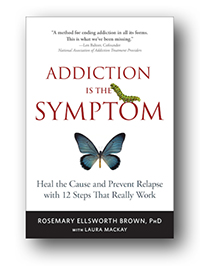“For 40 years, I’ve been interested in what it means to heal oneself”
 Dr. Brown and I were recently interviewed by Dr. Irene Conlan of Voice America’s Self Improvement Show. The hourlong discussion is a nice overview of Dr. Brown’s ideas and her step method. What is addiction and where does it come from? What’s wrong with the traditional Twelve Steps? How is her step method different? What are the key takeaways? Below is the audio and some excerpts, all Dr. Brown’s words. She’s the star of the show, after all!
Dr. Brown and I were recently interviewed by Dr. Irene Conlan of Voice America’s Self Improvement Show. The hourlong discussion is a nice overview of Dr. Brown’s ideas and her step method. What is addiction and where does it come from? What’s wrong with the traditional Twelve Steps? How is her step method different? What are the key takeaways? Below is the audio and some excerpts, all Dr. Brown’s words. She’s the star of the show, after all!
“This book feels very loving,” said Dr. Conlan, who appeared to have actually read the book (not all interviewers would). “It’s an incredibly insightful and helpful read. I totally recommend it. What Dr. Brown has done is give us a new gift of freedom. I think everyone who reads the book will understand what that means.”
“Who is an addict? Look in the mirror”
“I define addiction as any person place, thing, substance, or situation we think we cannot live without. When I first started, I thought of addiction as only substance addiction. But as my work progressed, I came to see that it was a much broader spectrum. People ask me now, Who is an addict, and I say look in the mirror. Because the first addiction is an addiction to control. That’s something that we all experience. And from that first addiction comes emotional dependency, and that is something that we all suffer from in one way or another.”
“I came finally to see that the work I was doing was really for everyone. Because everyone suffers from fear. Everyone suffers from emotional dependency and tries to manipulate and control other people and circumstances to their own ends. And the pain that comes from that, because it can’t work for very long, is enormous.”
“The only practical control is self-control. When you’re no longer dependent on other people, places, things, and substances, then you are in-dependent, rather than outer-dependent.”
“Animal training for humankind”
“Love is a gift. If I give something to someone and I expect anything back, even a thank-you, it’s ‘let’s make a deal.’ It’s not a gift, it’s a bribe. If I give you this, then you’ll give me that.… What we call love in our culture is not really love for the most part. It’s fear, control, and manipulation. Where that comes from is our parenting system, which I refer to as animal training for humankind. What this means is that the training is fear-based. The objective is obedience, through the control and manipulation of rewards and punishments.”
“One result of this is emotional dependency, and from the emotional dependency comes the first, the original, addiction of control, and from that comes every other symptom. Until the cause is dealt with, the emotional history that accumulates as we live, this is the only format we have for living. Any time you’re afraid, or any time you’re trying to control and manipulate a person, a situation, a substance, you’re already in addictive behavior. Therefore you’ll reach for alcohol, a prescription drug, food, a new relationship, or work, or sex, or any number of symptoms.”
“Twelve-step programs are symptom managment”
“Twelve-step programs are symptom-management oriented. It’s alcohol or it’s narcotics or it’s weight. These are the symptoms. You address one symptom, and another takes its place until you deal with the cause. I love Alcoholics Anonymous for what it does, but because it is symptom oriented, relapse is bound to occur one way or another. Those who stop drinking will go to sugar, then they’ll go to exercise, then a relationship. It’s all symptom substitution. No healing can occur. The research I’ve done has been on the fear, control, and manipulation that are at the core.”
“It’s not just 12-step programs. Addictionologists and addiction therapists abound in the world. But they’re still dealing with symptom management too. Addiction treatment has always been about symptom control. What that always results in is relapse.”
“A hunger for a spiritual life”
“Carl Jung said in a letter to Bill W., one of the founders of AA, that he saw alcoholism as man’s thirst for god. When I was doing my research, I also looked at obesity and saw that the hunger people have might very well be described as Jung described, a spiritual thirst, a hunger for a spiritual life—something that is life giving—which unfortunately we do not have much of today.”
“Mind your own business”
“What is learned by doing this process? It was not that many years ago that I realized that any time I blame someone else for the way I feel, I am not directing the question where it belongs. In other words, I am responsible for my own feelings. And one of the things the work teaches you is really to mind your own business. Your life is your business, and other people’s lives are theirs. You have more than enough to do if you keep your own doorstep clean. It gives you a sense of independence, and a sense that of knowing that you’re responsible for your response to whatever life brings. Your happiness or your hell depends on your response.”
“We can’t afford to be honest”
“Part of the step process is learning that our honesty is in direct ratio to how much we want from another person. We can’t afford to be honest because as children, we couldn’t be honest with our parents and get our needs met. And this is our framework for every relationship we have, with our selves and others, throughout our lives.”
“It’s learning how to live instead of survive”
“What the work is about is helping people understand that underneath all the conditioning that you’ve been subjected to, you’re perfectly fine. There’s absolutely nothing wrong. You’re left with all the goodness that you came in with because you’ve gotten rid of the majority of negative conditioning that you were trained in from your first breath.”
“What it means practically is that for the first time in your life you have a present tense and a future, because you’ve dealt with the past to a great extent. And that means that all the energy you’ve been expending trying to manage and control everyone and everything outside yourself, you can now use that energy, which is magnificent, to reach the potential, the great purpose, you had when you were born. You know what you want, you know what you don’t want. You know how to lead your life. You have a spiritual foundation—it’s not religious, it’s spiritual—a life-giving foundation, instead of a fight-or-flight, control-manipulation system.”
“It’s learning for the very first time how to live instead of how to survive.”
See the glossary: Fear, control, and manipulation




